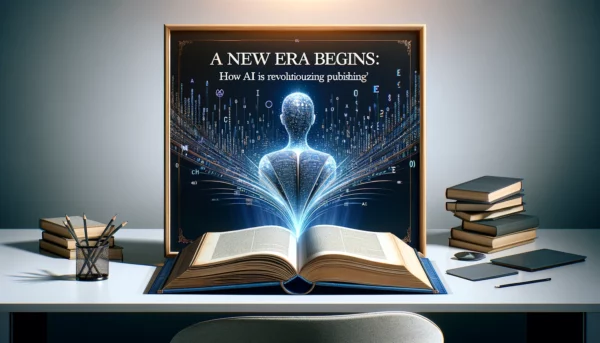The publishing industry has undergone significant transformation over the centuries, evolving from manual printing presses to digital platforms. In recent years, Artificial Intelligence (AI) has emerged as a pivotal force, revolutionizing the way books are marketed and sold. This article delves how AI is changing book sales, exploring how cutting-edge technology is not only reshaping publishing strategies but also opening new avenues for authors, readers, and publishers alike.
The Rise of AI in the Publishing Industry
The publishing industry traditionally relies on human expertise for content creation, editing, and marketing. However, the emergence of AI has marked a significant shift. Traditional methods, which often involve guesswork in market trends and reader preferences, are being supplemented with data-driven AI algorithms. These algorithms analyze vast amounts of reader data to predict market trends and consumer behavior with remarkable accuracy.
Recent statistics illustrate AI’s growing footprint in publishing. For instance, a survey by Publishers Weekly revealed a 30% increase in AI adoption for market analysis and targeted marketing in the last two years. Another study highlighted that AI-driven recommendations contribute to 35% of online book sales, demonstrating AI’s effectiveness in aligning reader interests with published content.
Your Publishing Journey Awaits – Start NowHow AI is Changing Book Sales?
AI is transforming book sales by bringing sophisticated algorithms to the forefront of market research and sales prediction. These AI systems analyze extensive data sets to identify emerging trends and forecast future market demands with remarkable precision. This shift enables publishers to align their strategies with real-time market dynamics, ensuring that they are always a step ahead.
Moreover, AI’s ability to decode and predict reader preferences is revolutionizing how books are marketed and sold. By sifting through data to provide valuable insights on reading habits and purchase history, AI tools can tailor recommendations to individual readers, significantly enhancing customer engagement and driving sales. This data-driven approach is rapidly becoming indispensable in the highly competitive world of book publishing, where understanding and adapting to reader preferences is key to success.
AI-Generated Content: A New Frontier in Publishing
AI-generated content represents a groundbreaking frontier in publishing, introducing generative AI tools that are reshaping content creation. These tools assist in drafting text, suggesting narrative structures, and even generating whole articles. They serve as powerful aids in the creative process, enhancing the efficiency and breadth of various industries of content production.
However, the interplay between AI and human creativity is crucial. While AI can produce content rapidly, it needs more nuanced understanding and emotional depth inherent in human writing. The most effective use of AI in publishing thus involves a collaborative approach. Writers and editors use AI-generated drafts as a foundation, infusing them with human insight, creativity, and emotional resonance. This synergy ensures that the final product retains the warmth and relatability that only human authors can impart while leveraging the efficiency and analytical capabilities of AI. This balance is key to harnessing AI’s full potential in redefining the future of written content.
AI Tools in the Writing and Editing Process
AI tools are revolutionizing the writing and editing process, offering significant assistance to authors and publishers. These tools, powered by advanced algorithms and natural language processing (NLP), aid in various stages of content creation. For writers, AI can suggest plot developments, character arcs, and even alternative phrasings or dialogue options. In editing, AI tools are invaluable for grammar and style checks, often surpassing traditional word processors in their ability to detect nuanced errors and suggest improvements.
The incorporation of NLP is particularly transformative. NLP enables AI to understand and process human language in a way that mimics natural human comprehension. This capability allows AI tools to analyze text for coherence, readability, and stylistic consistency, ensuring the final product is polished and engaging. These tools can also identify overused words, jargon, and passive voice, helping writers refine their work to a professional standard. The result is a seamless integration of AI assistance that enhances the overall quality of written content without diminishing the author’s original voice and creativity.
AI and Self-Publishing: Empowering Authors
The rise of self-publishing has been significantly bolstered by AI, providing authors with new technology and tools once exclusive to large publishing houses. AI technology plays a critical role in various aspects of self-publishing, from manuscript development to marketing and sales strategies.
For content creation, AI offers grammar and style suggestions, making manuscripts sharper and stories more engaging. More sophisticated AI systems can even analyze plot structure and character development, offering insights that can enhance the storytelling aspect of a book.
In terms of marketing and sales, AI’s impact is profound. Self-published authors can use AI to analyze market trends and reader preferences, gaining valuable insights into what audiences seek. This information is invaluable in shaping marketing strategies, cover design, and even book titles to better appeal to target demographics. AI algorithms also assist in optimizing online book descriptions and keywords, increasing visibility in a crowded digital marketplace.
Your Publishing Journey Awaits – Start NowExamples of AI-powered platforms:
Quillbot is primarily a paraphrasing tool. Quillbot uses AI to help writers rephrase and enhance their content. It’s useful for editing and improving the clarity and flow of writing.
Wordsmith by Automated Insights is a natural language generation platform that turns data into human-like narratives. It’s now widely used in journalism and business intelligence to generate reports and news articles.
Spines is a great example of an AI-powered publishing platform. Spines provides authors with an extensive variety of services and tools to format, edit, and publish their books efficiently. These services include cover design, advanced formatting, editing, proofreading, and AI-assisted global distribution.
By equipping authors with such advanced tools, AI is leveling the playing field in the publishing industry, making self-publishing a more viable and competitive option.
Marketing and Sales
By leveraging AI algorithms, publishers can deploy targeted marketing campaigns, reaching the right audience at the right time. Personalized book recommendations generated by AI have proven to increase engagement and sales by aligning closely personalized recommendations with individual reader preferences. AI’s role in market analysis and promotional strategies is expected to grow, with predictive analytics playing a key role in identifying emerging trends and potential market shifts. This evolution signifies a future where AI not only understands reader preferences but also anticipates them, driving sales in an increasingly dynamic publishing environment.
Additionally, AI is likely to play a crucial role in making content more accessible globally. This growing dependence on AI promises to streamline publishing processes and unlock new creative possibilities, significantly reshaping the industry.
In conclusion, AI’s transformative role in the publishing industry marks a new era of innovation and efficiency. From enhancing writing and editing processes to revolutionizing marketing strategies and reader engagement, AI’s impact is profound and far-reaching. The future of the book publishing industry lies in a synergistic blend of AI and human creativity, where technological advancements complement the irreplaceable human touch. This partnership promises to not only streamline processes but also foster new creative possibilities, shaping a dynamic and exciting future for the world of publishing.







